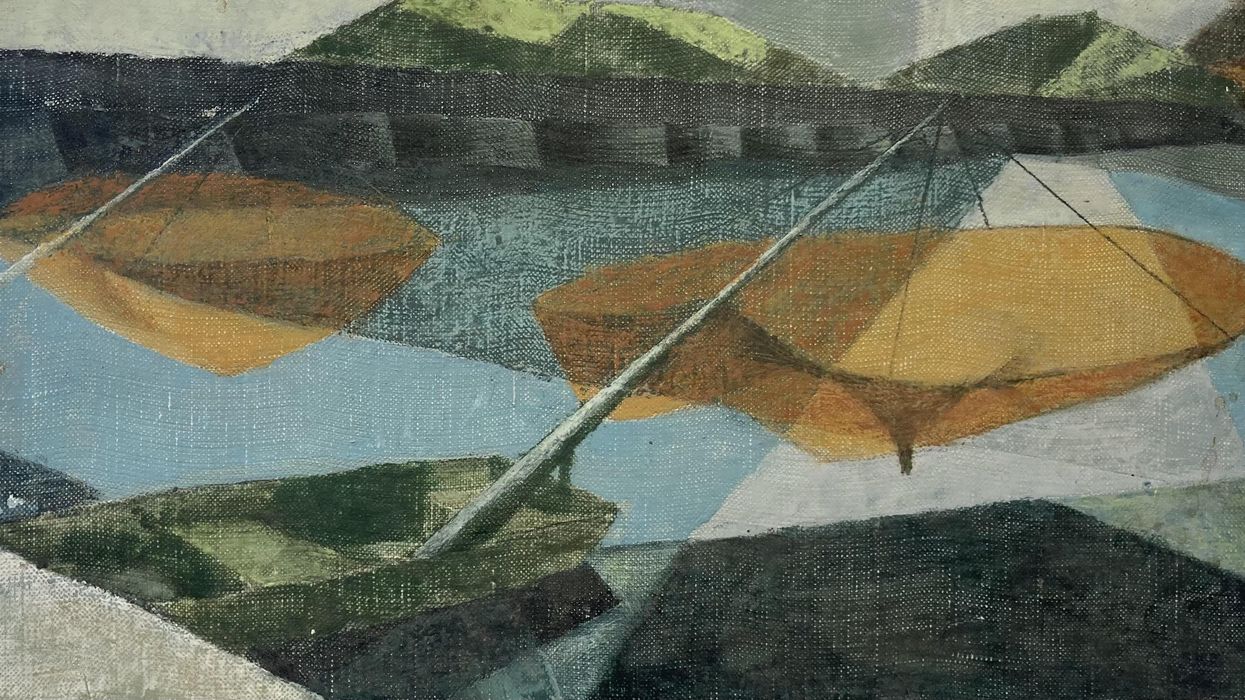A Son Remembers His Dad — and Fellow Artist — Through a Retrospective at Redbud

'Boats with Fishing Nets'
ONE CAN’T HELP but be moved when listening to Michael Roque Collins speak about his father, Lowell Daunt Collins, a renowned artist, teacher, gallerist, lecturer and appraiser who taught hundreds of students in his lifetime and passed away in 2003. “He loved people,” says Michael. “He loved teaching and sharing ideas. I think that and making art were his two great assets."
To celebrate the legacy of his father, who was also the dean of the Museum School of Art (now known as the Glassell School) for over a decade, Michael has teamed up with Redbud Gallery for Hidden Treasures of Lowell Daunt Collins. It’s a retrospective of paintings and works on paper Lowell created in the years between 1940 and 1980. The exhibit is currently on view through March 1.
Born in 1955, Michael grew up an only child in a three-bedroom place on Drexel Street, where every room opened into a garden. He recalls drawing with Crayola crayons in his crib while his mother, Glinda Gayle Pritchett, a talented watercolorist and published poet, worked on her ceramics, and the scent of melting wax wafted through the house as Lowell created his encaustic paintings. “It was so intoxicating,” says Michael, who, being dyslexic, often communicated with his parents and the world at large through drawing and painting.
Michael sees a profound concern for the human condition in all of his father’s work, be it figurative — as in his acrylic portrait of Ruth Uhler, the first curator of education at MFAH — or abstract, as in the haunting, surreal encaustic “The Last Supper,” with its intimations of betrayal and crucifixion. Meanwhile, Lowell’s eerie “Night Series” are dark, mysterious landscapes, with distant pinpoints of light that could be coming from the hellish interior of a smelting factory, or a single candle illuminating the humble home of a working-class family.
Those familiar with the spooky, dream-like images of scorched earth and sinking cathedrals in Michael’s paintings will see a direct influence here. Alongside these haunting works, Hidden Treasures features several of Lowell’s humorous drawings and etchings, including “Dancing Man,” an etching of an uninhibited, bearded beatnik happily boogying in the middle of nowhere, and “Seated Man,” in which black ink is scratched away to render a middle-aged man deeply immersed in reading a newspaper while a nude woman, her outline like something drawn by Jean Cocteau, emerges from the newsprint (or, more likely, the weary man’s imagination).
Throughout their lives and respective careers, Lowell and Michael remained very close, both as father and son, and as fellow artists, and continued to communicate with pen, ink and paper. “Back in the mid-80s, I’d be on a train with him in Europe,” says Collins. “We’d stay up late, all night, and we’d both be drawing what we saw from the windows, just to see how fast we could render those flickering views of train scenery flying by. And he’d say, ‘Hah! Mine’s better than yours!’ or ‘Oh, you beat me on that one!’”

'Divided Self'

'Portrait of Ruth Uhler'

'Self Portrait in Yellow Shirt'
- Art Car Parade Is Focus of Photographer Emily Jaschke's ... - Houston ›
- Dynamic Group Show at Blaffer Demonstrates Anxiety ... - Houston ›
- Two for a Show? A Groundbreaking New Gallery Opens ... - Houston ›
- 'Selfie with Godzilla'?! Artist Fuses Reality and Science ... - Houston ›
- In New Gallery Show, Guerrilla Artist Displays Black ... - Houston ›
- After Artist's Tragic Death, His Daughter Looks to the Stars in Moving ... ›
- Popular Singer-Songwriter's Genre-Bending Art Show Is a Hit - Houston CityBook ›
- Watercolorist Collins Paints the Town, Caps a Busy Holiday Season with Solo Show at Redbud - Houston CityBook ›
- Two Artists Cultivate Friendship from Halfway Across the Globe — and Show Their Work at a Houston Gallery - Houston CityBook ›












